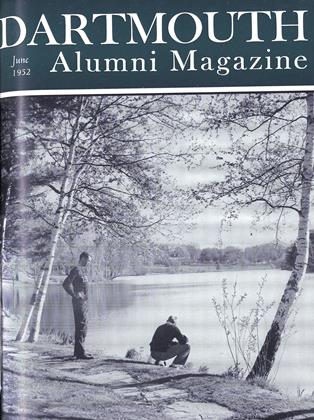Catholicism, and Freedom "Such Is Life"-Literary America-Anatomy of Communism
by James M. O'Neill 'oj. Harper andBrothers, 1952, xii and 2S7 pp. $3.50.
In America we tend at times to avoid the question of the relations between Catholicism and Democracy as if the mere discussion of it would involve us in prejudice. At other times we seem to plunge into a fever-heat of argument as if some crisis were upon us.
Prof. James M. O'Neill '07 of Brooklyn College, a prominent Catholic layman and educator, in his Catholicism and American Freedom presents a heated critique of the popular volume of Mr. Paul Blanshard, AmericanFreedom and the Catholic Power. Prof. O'Neill performs a much-needed task very well. If we are ever to have a sane discussion of this issue, the public mind must be disabused of the careless generalizations so often given out by critics of Catholicism as "official Catholic doctrine." The value of Catholicism and AmericanFreedom lies partly in the careful way in which the author has exposed such careless generalizations on the part of Mr. Blanshard. To cite only one example, Mr. Blanshard would have us believe that the Catholic Church teaches that anyone who deliberately rejects Catholicism will go to Hell. As stated, this is bound to be misleading, bound to stir up charges of a serious nature. The actual Catholic position, however, as Prof. O'Neill points out (p. 201), is that those who believe Catholicism to be the truth and then deliberately reject it will be punished in Hell.
The greatest positive contribution of this volume is to clarify, though perhaps too briefly, the assumptions which underlie Mr. Blanshard's position vis-a-vis the assumptions of the Catholic Church. The latter believes that the state is limited by a higher, divine law, and that it is the duty of the citizen to refuse obedience to any civil law which directly violates the divine law. (This assumption is, of course, shared by Protestantism.) It is clear that the logic of Mr. Blanshard's position drives him toward the notion of the absolute supremacy of civil law. He feels that ultimate sovereignty lies "wholly in the people," and he objects to the idea that God is the "real source of authority." Here is an issue which is really worth debating, an issue which is coming increasingly into prominence because of our tendencies in the direction of secularism. The further issue of whether the Catholic Church is, indeed, the sole infallible representative on earth of the divine law is not adequately dealt with by Prof. O'Neill. But it was not his purpose to discuss this matter, and it takes nothing away from the deserved credit of his work that he did not treat everything. It is to be hoped that this volume receives wide and careful attention.
 View Full Issue
View Full Issue
More From This Issue
-
 Article
ArticleDeaths
June 1952 -
 Class Notes
Class Notes1918
June 1952 By ERNEST H. EARLEY, DONALD L. BARR, RICHARD A. HOLTON -
 Article
ArticleThe Cold War and Liberal Education To a Father From a Dean
June 1952 By STEARNS MORSE -
 Class Notes
Class Notes1929
June 1952 By F. WILLIAM ANDRES, EDWIN C. CHINLUND, GEORGE B. REDDING -
 Class Notes
Class Notes1926
June 1952 By HERBERT H. HARWOOD, H. DONALD NORSTRAND, ANDREW J. O'CONNOR -
 Article
ArticleThe Undergraduate Chair
June 1952 By CONRAD S. CARSTENS '52
FRED BERTHOLD JR. '45
-
 Books
BooksTHE PHENOMENOLOGY OF MORAL EXPERIENCE.
July 1955 By FRED BERTHOLD JR. '45 -
 Books
BooksTHE LAST ADAM.
MAY 1967 By FRED BERTHOLD JR. '45 -
 Books
BooksCHRISTIAN FAITH IN BLACK AND WHITE: A PRIMER IN THEOLOGY FROM THE BLACK PERSPECTIVE.
May 1974 By FRED BERTHOLD JR. '45 -
 Article
ArticleEndowed Professorships
FEBRUARY 1973 By FRED BERTHOLD JR. '45, R.B.G.
Books
-
 Books
BooksFACULTY PUBLICATIONS
July 1920 -
 Books
BooksYANKEE DICTIONARY.
OCTOBER 1963 By C.E.W. -
 Books
BooksPlum in the Pudding
February 1977 By CHARLESG. BOLTE '41 -
 Books
BooksPORTRAIT OF PATTON.
December 1955 By COL. JACK C. HODGSON, USAF (RET.) -
 Books
BooksGREATER LONDON: THE POLITICS OF METROPOLITAN REFORM.
JUNE 1965 By H. WENTWORTH ELDREDGE '31 -
 Books
BooksMAXIMUM SECURITY WARD.
FEBRUARY 1971 By STEPHEN G. NICHOLS JR. '58

